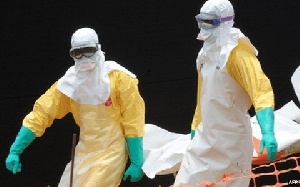The ECOWAS Assembly of Health Ministers has appealed to airlines to resume operations to countries affected by the Ebola Virus Disease for immediate supply of medical supplies and other essentials to contain the spread of the outbreak.
It said the current situation, especially in Liberia, was beyond the capabilities of the four affected countries and there was the need for other countries, partners, and organisations to assist them.
In a communiqué, issued at the end of the extraordinary meeting of the ECOWAS Assembly of Health Ministers on the Ebola Virus Disease, the Assembly pleaded with ECOWAS countries that had closed their borders to the affected countries to open up.
The exceptional closure of borders should be a subject of consultation with the affected countries since the closure of borders hampered economic productivity, it said.
“Countries are, therefore, advised to consult one another and seek the views of West Africa Health Organisation (WAHO) and WHO if borders exceptionally need to be closed,” it said.
The special meeting of the Ministers, in Accra from August 26th to 27th, was preceded by the meeting of Health Experts on the theme, “Ensuring Synergy of Appropriate Strategies and Efficient Response to Ebola virus disease (EVD) in the ECOWAS Region”.
It was attended by health ministers, epidemiological experts from the 15 ECOWAS countries as well as their health partners.
The meeting was to beef up implementation of strategies to contain the Ebola virus disease outbreak in the ECOWAS region.
It provided an update on the epidemic situation in the region; reviewed the implementation of recommendations from the various meetings on the epidemic, identified challenges, and made recommendations to address them.
The participants recommended an ad hoc Ministerial coordination group made up of Ministers of Health from affected countries and the set up a watch dog Technical Committee to be chaired by Ghana’s Minister of Health to monitor the situation.
Currently, the World Health Organisation, (WHO) in partnership with the Ministries of Health in Guinea, Sierra Leone, Liberia, and Nigeria have reported 3069 suspected and confirmed cases of the disease, with 1752 laboratory-confirmed ones, and 1552 deaths.
The Assembly called for the establishment of health and economic humanitarian corridors, the provision of financial support for scientific research, and the rapid contribution of countries and their private sectors into a fund to control the epidemic.
The ECOWAS Health Ministers recommended the strengthening of epidemiological surveillance at entry points, strengthening of health facilities through capacity building and the establishments of isolation and treatment centres as well as the provision of clear and consistent messages to be disseminated to everybody.
In Guinea, 648 cases of the disease, including 482 laboratory-confirmed ones, and 430 deaths were reported by its Ministry of Health and the WHO.
Active surveillance continued in Conakry, Guéckédou, Dubreka, Pita, Siguiri, Kourourssa, Macenta, Yamou, and Nzerekore Districts, it said.
Liberia’s Ministry of Health and Social Welfare and WHO have also reported 1378 clinical cases of EVD, including 322 laboratory-confirmed ones, and 694 deaths.
So far, suspected and confirmed cases have been reported in 13 of the 15 counties with laboratory testing being conducted in Monrovia.
In Nigeria, WHO and the Ministry of Health reported 17 suspected cases, including 13 laboratory-confirmed ones, and six deaths.
In Sierra Leone, WHO and the Ministry of Health and Sanitation reported 1026 suspected and confirmed cases of EVD, including 935 laboratory-confirmed ones, with 422 deaths. Reports, investigations, and testing of suspected cases continued across the country, they said.
The meeting described the outbreak in West Africa, notably in Guinea, Sierra Leone, Liberia and recently in Nigeria as a threat to regional and global public health safety, as well as to the economic and social security of the affected countries.
It is one of the most frightening ever experienced since the outbreak of the disease more than 40 years ago, it said.
The Ministers, however, urged people in the Sub-region not to panic but to adhere to the instructions given to them by health experts.
Dr Kwaku Agyeman-Mensah, Ghana’s Minister of Health, called for the mobilization of the community, religious and political leaders to improve awareness and understanding of disease.
“The crisis we have on our hands is a wake-up call to strengthen our health systems to deliver at all times, and as a community to rise up to the challenge of making health the first priority in our development drives,” he said.
General News of Saturday, 30 August 2014
Source: GNA













